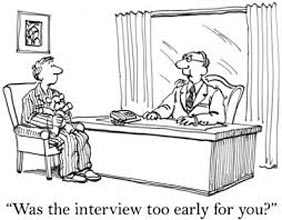 Having a decent if not great job and exciting career is a persistent focus of human activity. Fortunately so, because how else can we ever go shopping and find good new stuff on store shelves or the web?
Having a decent if not great job and exciting career is a persistent focus of human activity. Fortunately so, because how else can we ever go shopping and find good new stuff on store shelves or the web?
Every month, the U.S. Department of Labor releases the latest employment data, which are scrutinized by investors, politicians and regular folk alike. Happily, the labor market in the U.S. appears to be picking up somewhat over the last few years; recently, the news has been sufficiently encouraging that thousands more potential workers have entered or reentered the labor force.
Looking for a job is sometimes a piece of cake. (Right, maybe at Entemann’s?) Often, though, it is a daunting experience, one that pivots on a candidate’s ability to present himself well in an interview. CNN chimed in recently (9/16/14) with five interviewing “red flags” for employers to look out for, things that job hunters should also be mindful of. I thought they were pretty interesting.
- Arrives late. “There are many seemingly valid excuses for showing up late for an interview. But when you consider that making a good impression on a potential employer can be among the most important events in a person’s life, there’s little reason to expect that someone who’s late to an interview will behave any differently once they’re on the job.” Fair enough.
- Is unfamiliar with your company. “Any candidate worth serious consideration will demonstrate some basic knowledge about your business…” Another good one. Who wants to hire someone who couldn’t be bothered to find out such basics as what services or products are featured and who their competitors are?
- Is vague or evasive in answering questions. “Some job seekers have the ability to present themselves as comfortable, articulate, and even charming. But sometimes these qualities are superficial, with no substance behind them. This is something you can discern by asking follow-up and probing questions about their professional background, with special attention given to any claims they make on their resumes. If the answers are vague or evasive, it may be a sign they’re claiming more achievements than they actually accomplished.” Check.
- Won’t own past failures. “A strong job candidate will acknowledge their part in previous initiatives that failed to achieve intended goals. By contrast, a job seeker’s reluctance or inability to ever admit to an error can be a red flag. Everyone makes mistakes, but the most valuable employee is often the one who acknowledges when things go wrong and learns from them.”
- Criticizes their former employer. “Be on the lookout for a candidate who talks about a past employer in strictly, or even predominantly, negative ways. It’s unprofessional and in bad taste.”
These are all valuable insights. But not necessarily complete. They got me thinking about lots of other “don’ts” when it comes to looking for a job. One landmine, and not necessarily just for men, nearly blew up on me some thirty years ago, in Philadelphia. I was interviewing for a management consulting position with a major—as in MAJOR—firm with an international footprint. Toward the end of the interview, the interviewer confided that I did very well, except for having my (ack!) fly down the entire time. Apparently missing the breeze, I laughed, figuring he had to be joking, then thanked him for his time and proceeded to the train station to head back home.
Arriving at the train station, I was excited about the company. Having a few minutes before departure time, I stepped into the men’s room. Went to do my business and discovered (double ack!!) that my zipper had indeed been down and he wasn’t kidding. Sharing this little story with my dad afterward got him laughing. He had conducted countless job interviews including many for senior positions, and said to me, ”You probably really impressed him with your coolness when you didn’t even look down to check your fly after he mentioned it.” Hmm. Well lo and behold, I got the job. But my advice is, nonetheless . . . check for wardrobe malfunctions before you go in for an interview. Maybe take off that goofy hat.
A few other pointers:
Don’t laugh at everything your potential employer says. No one is that funny (well almost no one) and you may come across as nervous if not scared to death.
But don’t hesitate to smile. People like friendly people. Even jerks and unfriendly types do. So go ahead, smile from time to time.
If you have a quirky nickname (yeah, like Scooter) consider sticking with your real given name for the time being. Even if it’s something offbeat like Wingate or Wolfgang or Zane. You can go back to being “Scooter” after you’re on the job and they already know how wonderful you are.
Don’t keep excusing yourself to go to the bathroom or check messages. Who knows what conclusions and interpretations your not-yet boss might make about this. Wassamatter, forget to zip up your darned pants?
Don’t demand to be paid in cash, frozen chickens or beer every week. It just doesn’t sound right. Not in an interview anyway. First get the job and demonstrate your skills, then negotiate your compensation.
Try not to “call a spade a #$%^& shovel,” as my dad used to say, by telling the interviewer that he’s a jerk. Even if he’s proved it. Compliments are fine, but it would be a good idea to mean them. “Your name is Scooter, too? Wow, that’s way cool, dude.” (Uh, maybe go easy on that one.)
Fast forward a couple of weeks. You got the job! Yahoo! Here are a few more tips. First of all, grab a copy of the current AARP magazine (seriously) and note that it’s healthier to commute less than twenty miles a day. “Longer commutes are associated with higher blood pressure, more worrying and chronic stress.” Maybe you’ll need to carpool or get your new company to let you telecommute or move their business closer to your home. Yeah, that’s it, get them to move. Just “scoot” on over to your town.
Next, take a look at the feelgoodstore.com catalogue (it’s for real) and get ready to celebrate your new position with some fabulous products. There’s one on page 4 for a foot spa that lets you “start to rebalance and detox your body in just 30 minutes!” It’s easy, cheap and so beneficial: “Our foot spa helps eliminate toxins from your body and helps you feel energized.” Why not ask your employer to chip in for this invaluable product as it will surely pay off for them with you coming in to work so revved up every day? OK, maybe later.
And on page 6 they’ve got a gizmo that lets you “breath clearly with salt therapy.” (Never mind that you already live near a tidal marsh or creek.) Best of all, it uses 100% pure Himalayan salt crystals (what could be better?), “proven to thin mucus, decrease expectoration . . . ” Well, you get the idea. Holy Himalayas, it’s under 50 bucks, lasts up to five years and . . . gosh, I’m getting carried away.
OK, pal, deep breath, time to scoot back to work. And hold the salt.






